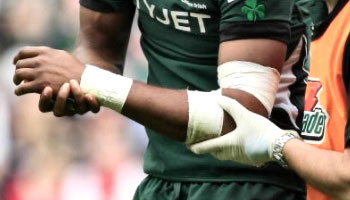
As the end of year Tests kick into gear, there isn’t a team taking part that hasn’t been affected by injury. While that has, and always will be a part of rugby, it seems that nowadays players are feeling the impact of professional rugby more than ever.
The IRB’s Medical Strategic Plan forum began in London today. It’s a two day conference that will have medical experts from each of rugbys leading countries in attendance. They will discuss the increased rate of injuries and physicality in the game, and hope to make recommendations regarding player welfare.
Theyre concerned that the demands on top players have become too great, referees arent enforcing the laws in certain aspects of play, and that players have quite simply become too big.
When looking at international sport, 220 out of 1000 hours are lost to injury in rugby. In American Football its 112 hours, Ice Hockey 80, Football, 40, and Cricket just 10 hours.
“We are reaching a level where the players have got too big for their skill levels,” said Lions team doctor James Robson at the end of their tour of South Africa in July.
“Players have become a little too muscle-bound and bulky,” he added.
Jonny Wilkinson’s list of injuries over the years includes a fractured shoulder, knee ligaments, ankle ligaments, haematoma, groin injury, damaged kidney, torn thigh muscles and a dislocated knee. Mike Tindall has had a ruptured liver, punctured lung, ankle ligaments, shoulder surgery, torn stomach muscles, broken foot and broken leg.
Jean De Villiers has missed two world cups due to injury, and Gavin Henson seems to have thrown in the towel after a career spent on the physio bench.
Former England centre Damian Hopley, who himself had his career cut short because of a knee injury, is now chief executive of the Rugby Players Association. Hes concerned about the prolific rate of injuries to players these days and feels that amongst other things, the reduction of squads due to the economic crisis, has had an affect.
“I feel sorry for the players and also the directors of rugby who are now in a results-driven business, he said. “They need results to save their jobs. It is a vicious circle. They have a very difficult task.”
Its clear that there are a number of factors involved in the high rate of injuries that are occurring at the moment. Too much rugby, bigger players, and refereeing inconsistencies seem to be the top three to blame.
The man who recently suspended Dan Carter for a week, Judge Jeff Blackett, says referees and citing officers are at fault for not taking sterner action when applying the laws.
“We are not applying the laws of the game or we are interpreting them too freely. If referees and citing officers applied the rules more rigidly, we may see a reduction of injuries at the breakdown.
“There is a balance between dynamism and safety, and I think it has gone too far in the wrong direction. In an effort to increase the attractiveness of the competition, we are in danger of damaging the game,” he said.
Time: 02:08
If can’t play because you’re injured and need some advice, visit www.expresssolicitors.com
Sign In